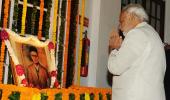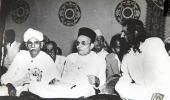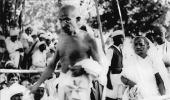Rahul Gandhi is neither Congress president, office-bearer nor Congress leader in Parliament.
This technical leeway provides adequate cover for Shiv Sena-Congress ties taking a nosedive, says Rasheed Kidwai.

The row over V D 'Veer' Savarkar is unlikely to destabilise the Uddhav Thackeray-led Shiv Sena-Nationalist Congress Party-Congress regime in Maharashtra.
Rahul Gandhi's strong words against Savarkar, spoken at a party rally in New Delhi, are part of the Congress strategy to present itself as the ideological alternative to Narendra Damodardas Modi-Amit Anilchandra Shah's Bharatiya Janata Party riding high on the Citizenship Act-National Register of Citizens narrative.
Even if the Modi government goes ahead and confers the Bharat Ratna on Savarkar, the development would not shake the Sena-NCP-Congress except for the Sena rejoicing and the Congress perfunctorily criticising the Modi regime for honouring a man who was briefly implicated in the Mahatma Gandhi assassination conspiracy case when Sardar Vallabhbhai Patel was Union home minister.
At present Rahul is neither Congress president, office-bearer nor leader of the Congress party in Parliament. This technical leeway provides adequate cover for Shiv Sena-Congress ties taking a nosedive.
And, of course, there is Sharad Pawar to work out a truce or act as a peace-maker if the Sanjay Raut-Rahul Gandhi verbal duel gets out of hand.
The internal dynamics between Sonia and Rahul within the Congress are interesting, as a former and 'likely to be' Congress president was consciously kept away from the Maharashtra government formation exercise.
Rahul was the Congress president from December 2017 to July 2019, but he displayed no keenness to reach out to United Progressive Alliance parties or forge new tie-ups. His track record in managing alliances is dismal.
In addition, there has been an element of mystery over whether Rahul's 'heart and soul' was for the Sena-NCP-Congress gathbandhan or not.
A section of the Congress leaders are not tired of pointing out that key Rahul aide K C Venugopal and other leaders belonging to the 'Kerala' lobby (A K Antony included) were against aligning with the Sena.
Moreover, a cursory look at contemporary Indian political coalition governments would show that ideology seldom creates a fatal wedge. Ideological posturing comes in handy, and becomes lethal, when partners lose trust and look for an excuse to part ways.
From Charan Singh raising the bogey of duel membership asking for the removal of Jan Sangh-RSS members from the Morarji Desai government to the BJP dumping Mehbooba Mufti in the erstwhile Jammu and Kashmir state -- all tell a story of ideology acting as spoiler only when inherent contradictions, one-upmanship become obvious.
In contrast, Mumbai's Mantralaya, the seat of Maharashtra's administrative power, at present appears robust and full of promise.
The Morarji Desai government was a mix of Hindu right Bharatiya Jan Sangh and various Socialist groups which had allies like the Shiromani Akali Dal and DMK, and barely two years into office the amalgam started cracking.
Charan Singh, the influential kisan leader, was subsequently sworn in as prime minister with the outside support of the Congress. The bonhomie between the Bharatiya Lok Dal and Congress saw their workers raising a curious slogan, 'Charan Singh laya aisi aandhi, desh ki neta Indira Gandhi (Charan Singh heralds a new wave with national leader Indira Gandhi).'
The V P Singh government fell due to the BJP's Ayodhya agitation when senior BJP leader Lal Kishenchand Advani embarked upon a rath yatra in 1990 seeking support for the construction of a Ram temple in Ayodhya.
The BJP was supporting V P Singh's regime from outside. Advani was arrested when the rath yatra entered Bihar, governed by the Janata Dal's Lalu Prasad Yadav. And the BJP pulled the rug from under the Singh government in Delhi.
Two United Front governments at the Centre fell in quick succession in 1997 when the Congress withdrew support from the H D Deve Gowda and I K Gujral regimes. While Deve Gowda was removed due to one-upmanship with then Congress president Sitaram Kesri, the rug from Gujral's feet was pulled over the Justice Milap Chand Jain commission of inquiry report that probed the conspiracy angle of the Rajiv Gandhi assassination.
The Jain Commission report, selectively leaked in the media, had hinted at a possible proximity between the DMK and the Liberation Tigers of Tamil Eelam responsible for the Rajiv Gandhi assassination.
The Jain Commission report had recommended that then Tamil Nadu chief minister M Karunanidhi and the DMK be held responsible for abetting Rajiv Gandhi's murderers. Ironically, the final report contained no such charges.
Then Congress president Sitaram Kesri was sympathetic to Gujral and was rather unwilling to pull the rug. Kesri, however, remained a mute spectator when the Gujral government fell as two senior party leaders, Arjun Singh and Jitendra Prasada, called the shots on Sonia Gandhi's behalf. It paved the way for the BJP's six-year rule led by Atal Bihari Vajpayee.
Sonia formally entered politics and took charge of the party in March 1998. Six years later, she was instrumental in the formation of a coalition government headed by Dr Manmohan Singh. It had the DMK as a 'trusted' ally. Even today, the DMK is one of the Congress's most reliable and all-weather friends.
On her part, Sonia seems determined to give Uddhav Thackeray a long rope and a full chance to run a coalition in Maharashtra. As per party insiders, she and Sharad Pawar are supposedly on the same page on this issue, providing the much needed support and longevity to the Sena-NCP-Congress alliance government.
Rasheed Kidwai, author and journalist, is a visiting fellow at the Observer Research Foundation. He can be contacted at news@rediff.co.in










